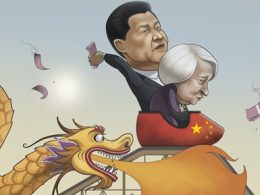In today’s world, the media has become an integral part of our lives. It shapes our opinions and influences our decision-making processes. However, with the rise of social media and online news sources, we are faced with a new problem: media misinformation. The spread of false or biased information can have serious consequences in politics, leading to misunderstandings and even conflict. In this blog post, we’ll explore the slippery slope of media misinformation in politics and discuss how we can combat it. Join us as we delve into this important topic!
The Problem of Media Misinformation
The problem of media misinformation is one that has plagued society for decades. With the rise of digital media, this issue has become even more pronounced. Misinformation can take many forms, from outright lies to subtle biases and omissions.
One major challenge with media misinformation is that it can be difficult to detect. In some cases, false information may be intentionally spread by those with a political agenda or financial incentive. In other cases, it may simply be the result of errors or misunderstandings.
Regardless of its source, media misinformation can have serious consequences in politics. It can lead to misunderstandings among citizens and lawmakers alike, making it difficult to reach consensus on important issues.
Moreover, when people are exposed to false information repeatedly over time, they may begin to accept it as truth. This phenomenon is known as the “illusory truth effect” and highlights just how insidious media misinformation can be.
Addressing the problem of media misinformation requires a multifaceted approach involving education, regulation and responsible journalism practices.
The Political Impact of Media Misinformation
The impact of media misinformation on politics cannot be overstated. It can lead to the spread of false narratives, divisiveness, and ultimately, harm democracy itself. When people are misled by news that is not based in fact, they may make decisions that do not serve their best interests or align with their values.
Furthermore, political leaders who rely on these tactics to gain support undermine trust in institutions and damage public discourse. In recent years, we have seen how misinformation has contributed to polarization and fueled conspiracy theories that erode faith in democratic processes.
Misinformation also perpetuates stereotypes and reinforces biases against certain groups of people. This creates a dangerous environment where discrimination and prejudice thrive under the guise of “news” or “opinion”.
The impact of media misinformation is particularly pronounced when it comes to election campaigns. When voters receive false information about candidates or issues at stake during an election cycle, it can sway their votes in ways that don’t reflect reality.
Ultimately, combating media misinformation requires collective action from individuals as well as institutions such as social media platforms and news organizations themselves. We must all work together towards a shared goal: ensuring accurate reporting for informed decision-making within our democracy.
The Role of Social Media in Politics
Social media has revolutionized the way we communicate and consume information. In recent years, it has also become a major player in politics, shaping public opinion and influencing election outcomes. The role of social media in politics cannot be overstated.
One key reason for this is the vast reach of social media platforms. With billions of active users worldwide, Facebook, Twitter, Instagram and other platforms offer politicians an unparalleled opportunity to connect with voters directly. This direct communication can help build trust and rapport between politicians and their constituents.
However, there is also a downside to the influence of social media on politics. Social networks are often unregulated spaces where fake news stories can easily spread like wildfire. Politicians may use these channels to spread misinformation or manipulate public sentiment in their favor.
Moreover, some argue that social media algorithms contribute to political polarization by creating “echo chambers” that reinforce existing opinions rather than exposing people to diverse perspectives.
Despite its drawbacks, it’s clear that social media will continue to play an important role in shaping the political landscape for years to come. As such, it’s crucial that individuals remain vigilant about what they read online while holding elected officials accountable for what they post on their own channels as well as how they behave offline
How to Combat Media Misinformation
Combatting media misinformation is a challenging task, and it can be overwhelming to try and separate fact from fiction. However, there are some steps you can take to help combat media misinformation.
Firstly, it’s important to check multiple sources for information. Don’t just rely on one news outlet or website; seek out alternative perspectives and viewpoints. By doing so, you can gather a more complete picture of the issue at hand.
Secondly, fact-checking is crucial in combating media misinformation. Be vigilant when reading articles or watching news segments that seem too good (or bad) to be true. Check your facts with trusted sources such as Snopes or FactCheck.org before sharing any information online.
Thirdly, engage critically with the content you consume. Ask yourself why this particular piece of information was shared? Who benefits from spreading this message? What evidence supports these claims?
Stay informed about how social media algorithms work and what effect they have on your feed. The way in which we consume news has changed significantly over the past decade due to social media’s influence on how content is prioritized and displayed.
By taking these steps towards combating media misinformation, we can all play our part in creating a more informed society where truth prevails over fake news and propaganda – ultimately leading us towards democratic enlightenment!
Conclusion
In today’s world, media misinformation has become a major issue in politics. It has the potential to sway public opinion on important issues and influence election outcomes. The rise of social media platforms has made it easier for false information to spread rapidly, making it harder for individuals to separate fact from fiction.
It is crucial for us as citizens to take an active role in combating media misinformation by being vigilant about the sources we rely on for our news and staying informed about current events. We must also hold our elected officials accountable for their actions and statements, fact-checking them whenever possible.
As content writers and SEO experts, it is our responsibility to ensure that we are providing accurate information that is well-researched before publishing any articles or blog posts. By doing so, we can help combat the spread of media misinformation and contribute towards building a more informed society.
While there may be no easy solution to this problem of media misinformation in politics, we can all play a part in mitigating its effects by being critical thinkers who demand transparency and accuracy from those who report the news.











